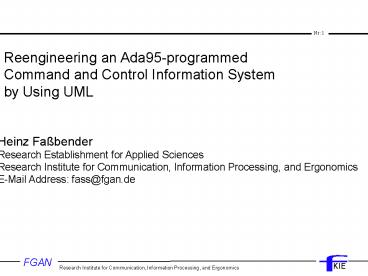Kein Folientitel - PowerPoint PPT Presentation
1 / 18
Title:
Kein Folientitel
Description:
Reengineering an Ada95-programmed Command and Control Information System by Using UML Heinz Fa bender Research Establishment for Applied Sciences – PowerPoint PPT presentation
Number of Views:74
Avg rating:3.0/5.0
Title: Kein Folientitel
1
Reengineering an Ada95-programmed Command and
Control Information System by Using UML
Heinz Faßbender Research Establishment for
Applied Sciences Research Institute for
Communication, Information Processing, and
Ergonomics E-Mail Address fass_at_fgan.de
2
Contents
- Structure of the existing system
- Why UML?
- INFIS Reengineering Process
- High-Level Architecture
- Low-Level Architecture
- Combination of High-/Low-Level Models
- Dynamic Model
- Requirements Model
- Conclusion
3
INFIS
- experimental integration platform for C2
information systems - test bed for the German part in the context of
the ATCCIS (Army Tactical Command and Control
Information System) study and MIP (Multilateral
Interoperability Programme) - platform independent access
4
INFIS Global Architecture
- consists of finitely many domains
5
Kernel
- selfdefined annotation
- difficult to understand
- no automatic codegeneration
6
Why UML?
- UML Unified Modeling Language
- understood by most of other interesting people
- nearly formal meaning
- standardized by Object Management Group
- automatic Code Generation by CASE-Tools
UML
7
INFIS Reengineering Process
INFISwithout UML-model
UML-models of INFIShigh-level structures
Manually modelling INFIShigh-level structures
Automatically reengineering INFISlow-level
structures with StP/UML
Separate UML-models of INFIS high-/low-level
structures
Manually combining INFIS high-/ low-level
structures
Static UML-model of INFIS
Manually modelling INFISdynamic behaviour
Static and Dynamic UML-model of INFIS
8
INFIS Reengineering Process (2)
Extract and model requirements
Requirements Model
Redesign of System
Redesigned Model
New requirements
Code generation reimplementation
Reengineered System
9
UML-Model of INFIS Global Architecture
(High-Level)
INFIS
1..
Domain
1..
Data Base
Subsystem
Handler
0..
0..
DBS
DBSD
Kernel
DBAP
GUI
10
UML-Model for a Kernel (High-Level)
11
Inheritance Tree (Low-Level)
automatically produced by reengineering component
of CASE-Tool Software through Pictures / UML
12
Detailed UML-Model (Low-Level)
- automatically produced by reengineering component
of CASE Tool Software through Pictures / UML
13
Combination of UML-Models of High-/Low-Level
Structures
14
Dynamic Model (Sequence Diagram)
Data Base
Application
Session
Control
User
Control
GUI
Control
start application
Application
start application
start application
start application
name of template
name of template
get information about template
send information about template
send information about template
send information about template
display template
display template
display template
template displayed
template displayed
template displayed
writing permission
writing permission
writing permission
notification
input
input data
input data
input data
application specific behaviour
15
Requirements Model
- Extract requirements from the models
- Model requirements in use case diagrams
16
How to continue?
- Redesign the complete system, such that only the
application level has to be extended in further
extensions Build your own application server - Use new techniques and buy an application
server Java 2 Enterprise Edition
17
INFIS Reengineering Process (2)
Extract and model requirements
Requirements Model
Redesign of System
Redesigned Model
New requirements
Code generation reimplementation
Reimplemented System
18
Conclusion
- UML-model of INFIS
- documentation of the system, readable by new
developers - extraction of requirements
- decision for new implementation































